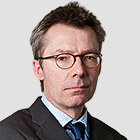Emmanuel Macron has faced criticism from France’s Nato and EU partners and a warning of conflict from Russia after he suggested it might be necessary to send ground troops to Ukraine.
After a high-level meeting in Paris of mainly European partners to discuss what urgent steps could be taken to shore up Ukraine in the wake of Russia’s recent frontline advances, the French president told a press conference he did not rule out sending troops.
He said he accepted no consensus existed for the plan, but in a taboo-breaking move he said nothing should be ruled out to achieve the defeat of Russia and the maintenance of security in Europe. “Today there is no consensus about sending ground troops in an official way, standing up for it and taking responsibility for it,” he said.
Allies were quick to rule out sending combat troops to Ukraine. White House national security council spokesperson Adrienne Watson said: “President Biden has been clear that the US will not send troops to fight in Ukraine,” while the Kremlin warned the appearance of Nato troops in Ukraine would make a direct confrontation with Russia inevitable.
Nato also announced on Tuesday afternoon that there were “no plans for Nato combat troops” in Ukraine. Poland’s prime minister, Donald Tusk, rejected the idea, as did Downing Street.
Sweden’s prime minister, Ulf Kristersson, also ruled out sending troops to Ukraine, appearing irritated that the proposal surfaced on the day the final hurdle for his country joining Nato had been cleared.
He said Macron could discuss whether France would send troops to Ukraine, but not Nato. “If a country sends troops somewhere else in the world it doesn’t affect Nato.”
Macron – who has a reputation for mercurial but sometimes counterproductive diplomatic initiatives – had hastily gathered 20 senior ministers from countries opposed to Russia because he feared the west was wringing its hands about Russian advances without preparing practical countermeasures.
The meeting also gave Macron a chance to advance his familiar call for Europe to strengthen its own defences and end its dangerous reliance on an increasingly isolationist America.
The German chancellor, Olaf Scholz, said bluntly there was agreement at the Paris Ukraine conference “that there will be no ground troops, no soldiers on Ukrainian soil” sent by European states or Nato states. “It’s important to keep reassuring yourself of this and the fact that this has taken place as an understanding is, in my view, a very, very good and very important step forward,” he said.
Macron had said on Monday that the west “must do whatever we can to obtain our objective” and that past shibboleths such as sending long-range missiles and planes had been cast aside, adding that “people used to say give them just sleeping bags and helmets”.
He said: “There is no consensus to officially back any ground troops. That said, nothing should be excluded. We will do everything that we can to make sure that Russia does not prevail.”
The comments also drew criticism from opposition politicians at home. The Socialist party leader, Olivier Faure, said Macron’s comments were “totally counterproductive” and had only served to divide the EU, while Éric Ciotti, head of the right’s Les Républicains, said Macron’s words were “fraught with terrible consequences”. Marine Le Pen, whose far-right National Rally party is the largest single opposition party in the lower house of parliament, said Macron was “posing an existential risk to 70 million French people”.
The French foreign minister, Stéphane Séjourné, sought to clarify the remarks in an address to the French parliament. “We must consider new actions to support Ukraine. These must respond to very specific needs, I am thinking in particular of mine clearance, cyber, the production of weapons on site, on Ukrainian territory,” he told MPs.
“Some of these actions could require a presence on Ukrainian territory, without crossing the threshold of belligerence. Nothing should be excluded. This was and still is the position today of the president of the republic.”
In Germany, Michael Roth, chair of the Bundestag foreign affairs committee and a member of Scholz’s SPD, said he was worried by signs of wider splits between Germany and France in their response to the Ukraine crisis, pointing to Scholz’s reiterated refusal to send Taurus long-range cruise missiles, and German opposition to an EU defence fund built on shared debt, an idea advanced by Estonia.
He described possible deployment of western ground troops as “a phantom debate” amid Ukraine’s most pressing problems. “I don’t know anyone who seriously wants that, not even in Ukraine,” he said. “Above all, they need ammunition, air defence, drones, long-range weapons.”
The row also distracted attention from progress at the meeting over the purchase of ammunition from third countries as a stopgap to meet an alarming Ukrainian deficit in bullets and shells.
The Czech prime minister, Petr Fiala, an advocate of mass joint purchases from third countries outside Europe, said: “I have the feeling that we should develop the cooperation methods that we began to implement after the start of the invasion. It is not necessary to look for new ways.”
The underlying problem is that European leaders have discovered they have not been able to direct an acceleration in arms manufacturing in Europe, and point to peacetime restrictions slowing progress such as planning permission needed to expand production lines. Ukrainian officials have said they require a minimum of nearly 200,000 shells a month, but Europe’s collective output remains only about 50,000 a month, according to an Estonian intelligence analysis – only some of which now go to Ukraine.
Macron did find an ally in Gabrielius Landsbergis, the Lithuanian foreign minister. “Europe’s fate is being decided on the battlefields of Ukraine. Times like these require political leadership, ambition and courage to think out of the box,” he said.













